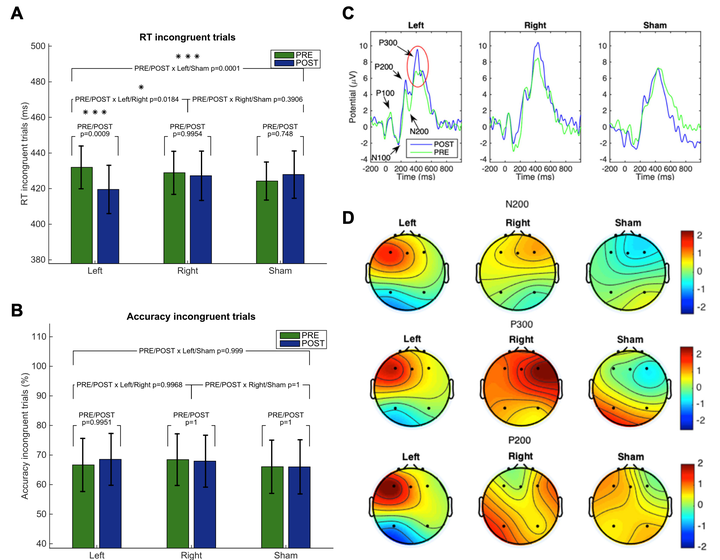Transcranial Direct Current Stimulation to the Left Dorsolateral Prefrontal Cortex Improves Cognitive Control in Patients With Attention-Deficit/Hyperactivity Disorder: A Randomized Behavioral and Neurophysiological Study

Abstract
Background: Attention-deficit/hyperactivity disorder (ADHD) is a neurodevelopmental disorder associated with significant morbidity and mortality that may affect over 5% of children and approximately 2.8% of adults worldwide. Pharmacological and behavioral therapies for ADHD exist, but critical symptoms such as dysexecutive deficits remain unaffected. In a randomized, sham-controlled, double-blind, crossover mechanistic study, we assessed the cognitive and physiological effects of transcranial direct current stimulation (tDCS) in 40 adult patients with ADHD in order to identify diagnostic (cross-sectional) and treatment biomarkers (targets).
Methods: Patients performed three experimental sessions in which they received 30 minutes of 2 mA anodal tDCS targeting the left dorsolateral prefrontal cortex, 30 minutes of 2 mA anodal tDCS targeting the right dorsolateral prefrontal cortex, and 30 minutes of sham. Before and after each session, half the patients completed the Eriksen flanker task and the other half completed the stop signal task while we assessed behavior (reaction time, accuracy) and neurophysiology (event-related potentials).
Results: Anodal tDCS to the left dorsolateral prefrontal cortex modulated cognitive (reaction time) and physiological (P300 amplitude) measures in the Eriksen flanker task in a state-dependent manner, but no effects were found in the stop signal reaction time of the stop signal task.
Conclusions: These findings show procognitive effects in ADHD associated with the modulation of event-related potential signatures of cognitive control, linking target engagement with cognitive benefit, proving the value of event-related potentials as cross-sectional biomarkers of executive performance, and mechanistically supporting the state-dependent nature of tDCS. We interpret these results as an improvement in cognitive control but not action cancellation, supporting the existence of different impulsivity constructs with overlapping but distinct anatomical substrates, and highlighting the implications for the development of individualized therapeutics